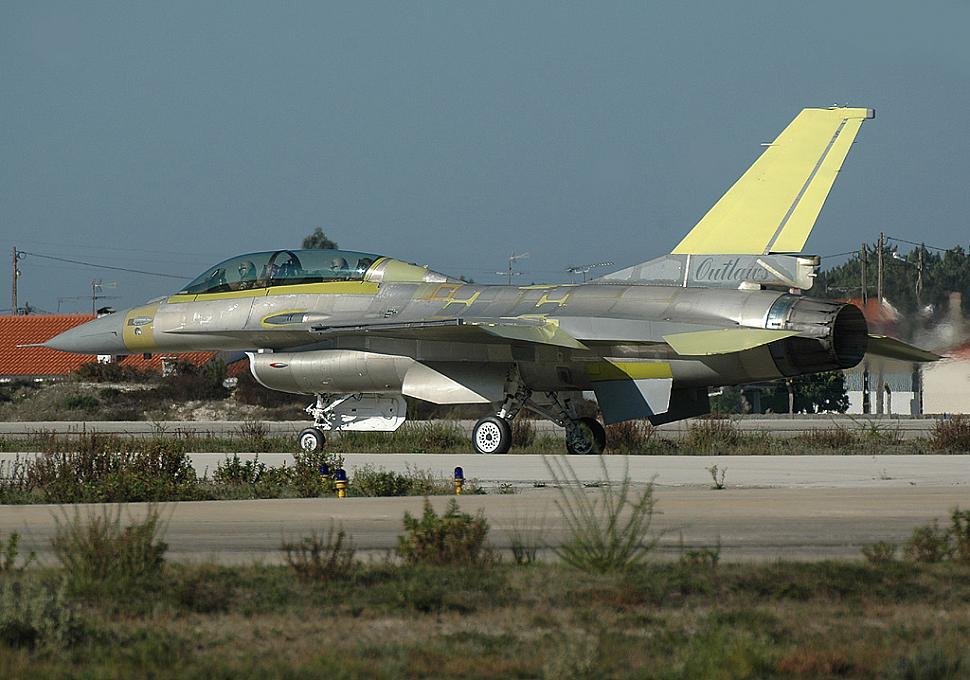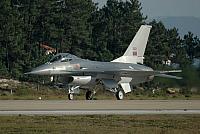Fighter Jet News
F-16 Fighting Falcon News
Lean initiatives in the Portuguese Air Force
December 3, 2008 (by
Lt. Col. Karn L. Carlson) -
There have been many articles touting the benefits to the Air Force of Lean initiatives and Air Force Smart Operations for the 21st Century, or AFSO 21.
It's not only the Air Force that is benefiting from Lean initiatives, however. Other airforces have benefited from the Lean initiatives supported by Air Force.
Portugal is a founding member of NATO and a key ally of the United States. The Portuguese air force, or PoAF, procured a total of 45 F-16 fighters from the U.S. All of the fighters are block 15 A and B models, and 40 of them required a mid-life upgrade, or MLU, as well as Falcon Up and Falcon Star structural upgrade modifications. Being part of the F-16 Multinational Fighter Program, the MLU configuration is similar to the U.S. Air Force's common configuration implementation program.
PoAF has a strong engineering tradition and Portuguese maintainers were committed to performing as much of the upgrade work as possible. Also, Portugal was the first country to do the three big upgrades simultaneously.
The program was divided into four sections, or 'docks'. OGMA, the leading aviation maintenance company in Portugal, is now responsible for Docks 1, 2 and 3, while PoAF maintainers are responsible for Dock 4.
Dock 4 of the MLU consists of final assembly, re-installing flight control surfaces, avionics, operational checks, testing fuel system, and installation of the engine, prior to preparing the aircraft for it's test flight.
Until 2007, this process was averaging 278 days per aircraft. For a small country like Portugal, every aircraft counts, and this was a tremendous drain on PoAF's operational capability.
PoAF engineers analyzed the situation, and with the aid of Air Force Lean experts from Hill Air Force Base, Utah, they determined a variety of areas where they could improve the process. Together with the Air Force experts, PoAF engineers and technicians developed a future state map and a job sequencing package, implementing four cells of 25 days and a 100 production day cycle time. Standard work, 6S -- a program designed to eliminate waste and maximize value-added work -- and visual management were key for the improvements.
One of the steps taken was to ensure that, prior to the beginning of the duty day, all the requisite parts were laid out immediately available for the technicians. This simple improvement meant technicians didn't need to head back to the supply room every time they needed a part.
All of these improvements together have helped PoAF maintainers decrease the time required for Dock 4 to an average of 118 days. That's a reduction of nearly 60 percent. That means more aircraft are available more quickly, leading to improved operational capabilities for PoAF.
Another process that required improvement was the testing of aircraft wiring. Previously, 23,500 wires on the F-16 had to be tested individually. This process took five weeks, and wasn't always accurate. PoAF officials procured an automated wire test bench to improve the process. The new machine takes two days to connect all the wires, but can perform a test on every aircraft wire in just four hours. Overall, this represents a time savings of more then one month. The quality has improved tremendously, officials said.
The culture is changing towards a continuous improvement environment with everybody's participation, understanding that more can be achieved by working together more efficiently.
Portuguese air force officials have realized tremendous improvements in efficiency from the employment of Lean operations techniques. Maj. Gen. Manuel Chambel, the Portuguese air force F-16 program director, recently visited Air Base 5, at Monte Real, Portugal, to receive briefings on the Dock 4 process.
General Chambel said that he had almost lost hope of improving the productivity on the MLU program, but was tremendously encouraged to see the aircraft coming out of Dock 4 according to 'takt time.' Takt time is a Lean term used to identify the rate that a completed product needs to be finished in order to meet customer demand.
Lean techniques have led to significantly increased operational efficiencies and capabilities for the Portuguese air force.
(Lt. Col. Pedro Alexandre E. Salvada; deputy director of the Portuguese air force F-16 upgrade program co-authored this article)
Portugal is a founding member of NATO and a key ally of the United States. The Portuguese air force, or PoAF, procured a total of 45 F-16 fighters from the U.S. All of the fighters are block 15 A and B models, and 40 of them required a mid-life upgrade, or MLU, as well as Falcon Up and Falcon Star structural upgrade modifications. Being part of the F-16 Multinational Fighter Program, the MLU configuration is similar to the U.S. Air Force's common configuration implementation program.
PoAF has a strong engineering tradition and Portuguese maintainers were committed to performing as much of the upgrade work as possible. Also, Portugal was the first country to do the three big upgrades simultaneously.
The program was divided into four sections, or 'docks'. OGMA, the leading aviation maintenance company in Portugal, is now responsible for Docks 1, 2 and 3, while PoAF maintainers are responsible for Dock 4.
Dock 4 of the MLU consists of final assembly, re-installing flight control surfaces, avionics, operational checks, testing fuel system, and installation of the engine, prior to preparing the aircraft for it's test flight.
Until 2007, this process was averaging 278 days per aircraft. For a small country like Portugal, every aircraft counts, and this was a tremendous drain on PoAF's operational capability.
PoAF engineers analyzed the situation, and with the aid of Air Force Lean experts from Hill Air Force Base, Utah, they determined a variety of areas where they could improve the process. Together with the Air Force experts, PoAF engineers and technicians developed a future state map and a job sequencing package, implementing four cells of 25 days and a 100 production day cycle time. Standard work, 6S -- a program designed to eliminate waste and maximize value-added work -- and visual management were key for the improvements.
One of the steps taken was to ensure that, prior to the beginning of the duty day, all the requisite parts were laid out immediately available for the technicians. This simple improvement meant technicians didn't need to head back to the supply room every time they needed a part.
All of these improvements together have helped PoAF maintainers decrease the time required for Dock 4 to an average of 118 days. That's a reduction of nearly 60 percent. That means more aircraft are available more quickly, leading to improved operational capabilities for PoAF.
Another process that required improvement was the testing of aircraft wiring. Previously, 23,500 wires on the F-16 had to be tested individually. This process took five weeks, and wasn't always accurate. PoAF officials procured an automated wire test bench to improve the process. The new machine takes two days to connect all the wires, but can perform a test on every aircraft wire in just four hours. Overall, this represents a time savings of more then one month. The quality has improved tremendously, officials said.
The culture is changing towards a continuous improvement environment with everybody's participation, understanding that more can be achieved by working together more efficiently.
Portuguese air force officials have realized tremendous improvements in efficiency from the employment of Lean operations techniques. Maj. Gen. Manuel Chambel, the Portuguese air force F-16 program director, recently visited Air Base 5, at Monte Real, Portugal, to receive briefings on the Dock 4 process.
General Chambel said that he had almost lost hope of improving the productivity on the MLU program, but was tremendously encouraged to see the aircraft coming out of Dock 4 according to 'takt time.' Takt time is a Lean term used to identify the rate that a completed product needs to be finished in order to meet customer demand.
Lean techniques have led to significantly increased operational efficiencies and capabilities for the Portuguese air force.
(Lt. Col. Pedro Alexandre E. Salvada; deputy director of the Portuguese air force F-16 upgrade program co-authored this article)
Courtesy of Air Force Link/Office of Defense Cooperation, Portugal.
Additional images:
Related articles:
Forum discussion:
Tags
- PoAF F-16s to be fitted with LITENING AT system (2008-08-01)
- Roll out of first Portuguese MLU (2003-06-27)
- Portugal to expand its F-16 Fleet (1998-12-03)
- F-16 Fighting Falcon news archive
Forum discussion:
- Start a discussion about this article in the F-16.net forum.
Tags


